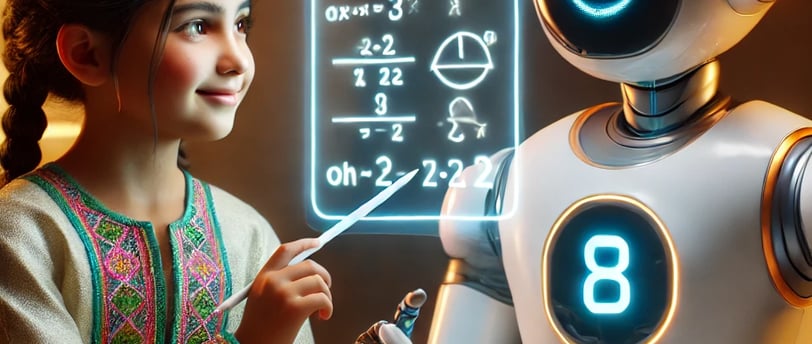Impact of AI on children?
What role will AI have on our children?
2/9/20253 min read


AI & Children: The Double-Edged Sword of the Future
When we think about AI, we often picture robots, self-driving cars, or virtual assistants helping adults with daily tasks. But what about children? How does AI impact the youngest generation—the kids growing up in a world where chatbots, smart toys, and personalized learning platforms are as normal as bedtime stories?
AI is transforming childhood in ways we never imagined, for better or worse. It’s a double-edged sword—one that can either empower or hinder the next generation, depending on how we use it.
The Good: AI as a Supercharged Learning Tool
AI has revolutionized education, making learning more engaging, personalized, and accessible. Children can now:
🔹 Learn at Their Own Pace – AI-driven platforms like Khan Academy, Duolingo, and ChatGPT-based tutors adapt lessons to match each child’s learning speed and style. No more struggling to keep up or waiting for the rest of the class to catch on.
🔹 Get 24/7 Support – AI tutors don’t get tired or impatient. If a child wants to practice math at 2 AM or needs help with a tricky science concept, AI is always there.
🔹 Explore the World in New Ways – AI-powered virtual reality lets kids explore ancient Rome, walk on Mars, or dive into the ocean—all from their living room. It’s hands-on learning without limits.
🔹 Assist Children with Disabilities – AI helps nonverbal children communicate, assists those with dyslexia in reading, and supports kids with ADHD in staying focused. The potential to break barriers in education is immense.
The Bad: The Hidden Dangers of AI for Kids
But AI isn’t all sunshine and rainbows. There’s a darker side that parents and educators must stay aware of.
⚠️ Privacy Concerns – AI-powered toys and learning apps collect massive amounts of data. Where is this data going? How is it being used? If we’re not careful, children’s information could be misused or sold without their knowledge.
⚠️ Emotional & Social Impact – Some AI chatbots and virtual friends are so advanced that children form emotional bonds with them, sometimes preferring AI companionship over real human relationships. While AI can reduce loneliness, it can also replace real-life social skills if kids aren’t encouraged to interact with others.
⚠️ Addiction & Over-Reliance – AI-powered apps are designed to keep children engaged. While this can be great for learning, it also creates a risk of screen addiction, reducing kids’ ability to concentrate, play outdoors, or engage in creative, unstructured activities.
⚠️ Bias & Misinformation – AI systems are only as good as the data they’re trained on. If the data is biased or incorrect, children could absorb misleading or harmful information without realizing it.
The Solution: AI as a Partner, Not a Replacement
The key to AI’s impact on children lies in balance. Instead of allowing AI to replace human connection and creativity, we should use it to enhance learning and play.
🔹 Set Healthy Limits – AI tools should supplement, not dominate a child’s education and entertainment. Encourage offline play, reading, and real-world experiences.
🔹 Teach Digital Literacy – Children need to understand how AI works, its strengths, and its flaws. Teach them to question information, recognize bias, and use AI responsibly.
🔹 Monitor & Guide AI Interactions – Parents and teachers should regularly check what AI tools children are using, ensuring they’re safe, unbiased, and educational.
🔹 Emphasize Human Relationships – AI should never replace real friendships, family bonding, or mentorship. Kids still need face-to-face interaction to develop emotional intelligence and social skills.
The Future of AI & Children
AI is here to stay, and its impact on children will only grow stronger. The question is: Will we use it wisely?
As AI Woman, we champion a future where AI supports human connection, learning, and creativity—without replacing what makes us truly human. The next generation is watching. Let’s give them an AI-powered world that enhances their potential, not limits it.
🔹 What do you think? How do you see AI shaping the future for kids? Join the conversation in the comments below!
